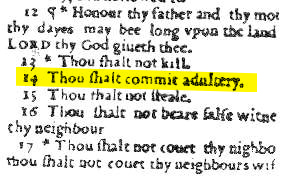
Robert Barker and Martin Lucas overlooked a crucial not in their Bible published in 1631. Brewer’s Dictionary of Phrase and Fable notes, “The fine of £300 helped to ruin the printer.” Further Bible errata:
- The “Cannibal Bible,” printed at Amsterdam in 1682, included the sentence “If the latter husband ate her [for hate her], her former husband may not take her again” (Deuteronomy 24:3).
- In the “Camel’s Bible” of 1823, Genesis 24:61 reads “And Rebekah arose, and her camels [for damsels].”
- In an edition published in Charles I’s reign, Psalm 14:1 read “The fool hath said in his heart there is a God.” The printers were fined £3,000, and all copies were suppressed.
- The “Lions Bible” of 1804 contains the phrase “but thy son that shall come forth out of thy lions [for loins]” (Kings 8:19). In Galatians 5:17 it reads “For the flesh lusteth after the Spirit [for against the Spirit].”
- In the second edition of the Geneva Bible, 1562, Matthew 5:9 reads “Blessed are the placemakers [peacemakers]: for they shall be called the children of God.” (Also, the chapter heading for Luke 21 has “Christ condemneth the poor widow” rather than “commendeth.”)
- A 1702 edition has David complain that “printers [princes] have persecuted me without a cause.” (Psalm 119:161)
- In a 1716 Bible first printed in Ireland, John 5:14 read “sin on more” rather than “sin no more.” “The mistake was undiscovered until 8,000 copies had been printed and bound.”
- The “Affinity Bible” of 1923 contains a table of affinity with the error “A man may not marry his grandmother’s wife.”
- In the “Standing Fishes Bible” of 1806, Ezekiel 47:10 reads “And it shall come to pass that the fishes [fishers] shall stand upon it.”
- A Cambridge printing of 1653 reads “know ye not that the unrighteous shall inherit the Kingdom of God?” instead of “shall not inherit.” (I Corinthians 6:9)
- In the “Wife-Beater’s Bible” of 1549, Edmund Becke inserted a footnote to I Peter 3:7 reading “And if she be not obediente and healpeful unto hym, endevoureth to beate the fere of God into her heade, that thereby she may be compelled to learne her dutye and do it.”
In one edition published in 1944, a broken bit of type in I Peter 3:5 caused own to appear as owl, producing the alarming sentence “For after this manner in the old time the holy women also, who trusted God, adorned themselves, being in subjection to their owl husbands.”
